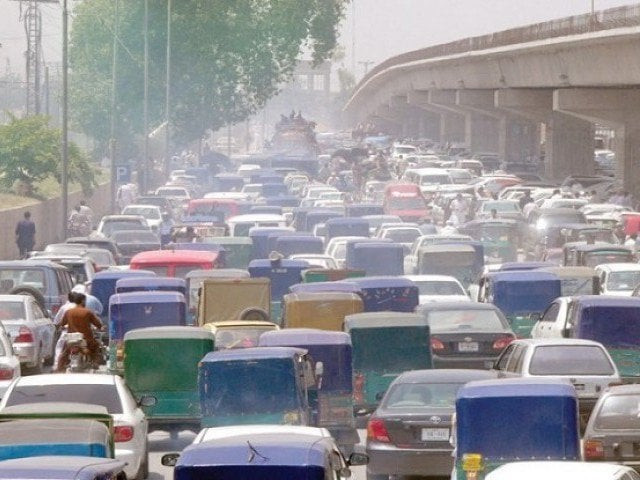THE CITY UNDER SMOG: Emissions from 400,000 vehicles largely unchecked
Only four VETS units available to check environmental fitness of cars

Only four VETS units available to check environmental fitness of cars. PHOTO: MUHAMMAD IQBAL/EXPRESS
Breathing in the busy streets of the provincial capital is harder than most of its citizens realise as only four mobile units exist to check the fitness of over 0.4 million vehicles in one of the 20 most polluted cities in the world.
An approximated 0.7 million vehicles enter and exit the provincial capital on a daily basis; huge plumes of smoke pour out of most of their rickety exhaust systems. Unsurprisingly, the air taken in by locals is far from the cleanest and is especially hazardous for those suffering from asthma.
Around 19 years ago, when the population was far less and fewer vehicles plied on the roads, GTZ, an NGO, set up vehicle emission testing stations (VETS) in Peshawar to check those motorcars causing pollution.
The VETS, however, were later handed over to the provincial government and decades later, only four mobile units are functioning in the provincial capital.

“We do have eight units at the divisional headquarters and 12 units across the province, but that is far from enough to test the estimated four million vehicles in Khyber-Pakhtunkhwa,” VETS Manager Pir Zubair Ali Shah says.
Shah tells The Express Tribune the four units operating in the provincial capital on a daily basis can only check some 250 vehicles between them. “It is ineffective as checking only these many vehicles of roughly 0.7 million coming in and out of Peshawar is hardly going to [help] improve the environment.”
He stresses the government must increase the number of units to at least eight so VETS could cover every major route in the provincial capital and identify smoke-emitting vehicles.
“It’s like using a glass to fetch water from an ocean,” states Shah. “Two traffic policemen accompany one unit and stop a vehicle for testing. VETS officials carry out the test and the police impose a penalty if it is not fit,” he adds. A fitness certificate is used for six months if it passes the test.
All clogged up
Traffic in the provincial capital has also increased manifold and it is difficult for traffic police to maintain a smooth flow. Some identify the shortage of alternative routes as a reason, especially during demonstrations or traffic jams.
“Currently we have some 1,123 traffic wardens,” Traffic SSP Sadiq Baloch says. “There are also plans to expand the warden system to routes such as Ring Road, Kohat Road, Charsadda Road, but it will take some time since we are short of staff.”
Baloch says it was initially planned to induct around 1,870 traffic wardens for the newly established system and personnel from other departments came on deputation. He reveals the traffic police also plans on hiring 800 additional wardens.
“The posts have been advertised and wardens will be available after tests and interviews,” he says, adding the fresh staff will include constables and assistant sub-inspectors. Baloch points out two phases of the system have been completed and the third and final phase begins next month.
He highlights some 10,000 taxis and more than 12,000 rickshaws carry passengers in the provincial capital on a daily basis, adding to the already chaotic traffic situation. While traffic has increased, resources remain almost the same and the roads cater to 0.7 million coming in and out of the city. At the same time, service roads can only accommodate some 0.2 million vehicles.
Published in The Express Tribune, March 29th, 2016.













COMMENTS
Comments are moderated and generally will be posted if they are on-topic and not abusive.
For more information, please see our Comments FAQ